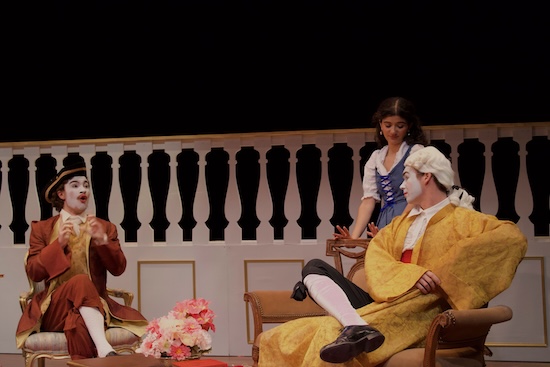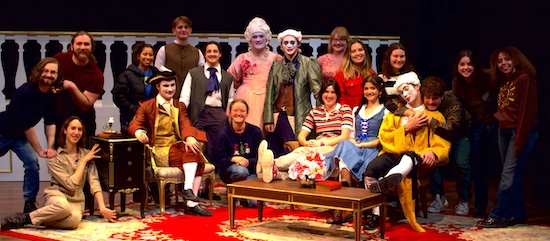
c/o Sophia Flynn
If there’s one thing that my time at the University has taught me, it’s that the most unexpected combinations can lead to the most magical experiences. Watching “The Game of Love and Chance” in the Patricelli ’92 Theater confirmed that belief as the audience and I were transported to the grandiose halls of a French palace in the 18th century using drag and techno music.
My roommate and I were already excited walking into the show on Friday, Dec. 6, 2024, well aware that director Sophia Flynn ’25 has been a pivotal force in student theater powerhouse Spike Tape over the last few years. I wasn’t familiar, however, with the source material or any other work by the playwright, Pierre de Marivaux, so I wasn’t sure what to expect. In an interview with The Argus, Flynn explained how she settled on “A Game of Love and Chance” as the play she would direct in partial completion of her thesis requirements for the theater major.
“I was the assistant director for [Shakespeare’s] A Midsummer Night’s Dream, [directed by Visiting Assistant Professor of Theater] Alex Keegan,” Flynn said. “While working on it, I just got so into Shakespeare’s dialogue…. I loved the old writing and how each word is so intentional. So I started shifting my focus towards older plays for [my thesis].”
Flynn’s passion for the project showed throughout my watching experience and in every aspect of the performance. From the very moment that the lights came up, I knew I was in for a treat.
Silvia (Chloé Naudet ’27), a young woman from a noble family, has been betrothed to a man she’s never met. She vents to her chambermaid, Lisette (Jeremy Meehan ’26), about the oppressive expectations thrust upon her as a woman of her status. To maintain the life she’s expected to have, she’ll have to marry a rich but uninteresting man who treats her poorly and fails to stimulate her intellectually. Desperate to avoid a life of misery and monotony, Silvia hatches a plan to switch places with Lisette while her fiance is visiting so that she can observe him without his knowing before committing to marriage.
Naudet’s fiercely independent and intelligent portrayal of Silvia elegantly articulated the nuances of the constraints and privileges of being a woman of her class at the time. Dissatisfied with the sphere that women were allowed to occupy at the time, she pours her wit into orchestrating this game of love and chance, evoking Regina George’s use of her superior intellect to control the social dynamics of her high school (though Naudet’s Silvia was quite a bit less devious).
Meehan provided the perfect foil as Lisette, the sweet but clueless chambermaid who plays the consummate romantic. Meehan’s balance of overconfidence and good intention was the perfect vehicle to deliver Lisette’s subtly subversive questions about the ways she’s limited by her class as well as her gender.
Silvia presents her scheme to her father, Monsieur Orgon (Christopher Roche ’27), and brother, Mario (Campbell Greenberg ’27), who lovingly mock her convoluted proposal but ultimately agree to play along. Once Silvia and Lisette run off to assume their swapped identities, Orgon reveals to Mario that he received a letter from Dorante (Maya Lozea ’26), Silvia’s intended fiance, that he has made a similar switch with his own valet, Arlequin (Justin Atnes ’28). Orgon encourages Mario to let the young lovers carry out their respective plans without revealing their true identities to one another; the two spend the rest of the play watching the hijinks that ensue with a gleeful sense of irony.
Roche, Greenberg, and Atnes took character acting to the next level in their performances. Roche and Greenberg fully embodied the ridiculous, stuffy personas of the wealthy Orgon men, delivering almost every single one of their lines to uproarious laughter from the audience. Atnes, who entered every scene with an appropriately silly musical flourish, added so much dimension to the rambunctious Arlequin through his physical comedy, practically throwing himself from one side of the stage to the other in all his scenes.
Flynn explained how their performances were inspired by the Italian tradition of commedia dell’arte, a style of performance in which many of the original actors of “The Game of Love and Chance” would have been trained.
“[Commedia dell’arte] is a very old Italian tradition of theater,” Flynn said. “All the characters wore certain masks and outfits that [indicated to the audience] who the character is. There was often not a lot of dialogue. It would be comparable to [being in the] circus now. So [Marivaux] was writing for actors who were trained in an improvisational, physical comedy style, and the actors and I were trying to recreate the audience reaction to the original play [in our production].”
Lozea, on the other hand, played Dorante with such tenderness and sincerity that he stood out as the perfect love interest for Silvia among the sea of extravagant and ludicrous men in her life. Despite believing Silvia to be a servant, Dorante falls hopelessly in love with her and is ready to throw it all out the window for this love: his money, title, status, everything. I found myself rooting for their romance, even though Silvia had so convincingly expressed her desire to remain unmarried earlier in the play. Flynn admitted that reconciling this contradiction was an important part of her process of interpreting the source material.

c/o Sophia Flynn
“Initially, when I was reading [“The Game of Love and Chance”], I was so frustrated because the characters seemed so trapped in their social circumstances,” Flynn said. “In the first scene of the play, Sylvia is like, ‘I don’t want to get married. Men disgust me.’ But, by the end, she just gets married anyway. I [wondered], ‘Why can’t she imagine a different future for herself?’ I asked myself, ‘What could I do to make myself like this play?’”
The answer she found was drag. By casting against gender, Flynn and her team reinterpreted the transgressive nature of the show’s inter-class romances that would have been very controversial at the play’s original conception. Flynn explained how having some actors in drag fit into her telling of Marivaux’s tale.
“For people seeing it [at the time], it would have been really crazy to watch even the suggestion of a cross-class romance,” Flynn said. “There’s not the same taboo around [those] relationships in modern-day America, but I thought that people at Wesleyan would understand the taboo around same-sex relationships. It also helped me to understand why Sylvia [goes from] hating all men to loving Dorante.”
Throughout the play, Orgon’s servant, simply called Valet (Brendan Kelso ’27), kept the audience chuckling with his exasperated facial expressions as he silently observed the antics of the rest of the cast. The play ends the way any good 18th-century masterpiece does: in a double wedding. Silvia and Dorante reveal their true identities and express their unending love for each other, as do Lisette and Arlequin.
The show’s artistic and technical elements were just as impressive as its performances. The lighting (designed by Alexander White ’26), sound (designed by Aden Sheingold ’26), and set (designed by Jordan Schwarz ’26) design were critical to bringing the audience into the world of the characters. The music (composed and produced by Parker Tey ’26 and performed by Tey, Vivian Orthwein ’27, and Stuart Conrad ’26) provided the perfect backing track to the characters’ shenanigans. Frankly, the costumes (designed by Greta Armbrust ’25), hair, and makeup (applied by Eliza Bryson ’26) were flawless.
Ultimately, “The Game of Love and Chance” was a colorful, high-energy, techno-fueled dreamscape and a delightful romantic comedy that delivered relevant messages about class, gender, and love in beautiful prose. Flynn expressed her gratitude for the support for the show and her hope that audiences left feeling a renewed connection to an older piece of work.
“The point was to make the play accessible to everyone,” Flynn said, “ People sometimes have a mental block around classic theater because [they] think [they’re] not smart enough for it. It’s the director’s job to present [the material] to you in a way that you can understand, so I was trying to contextualize [‘The Game of Love and Chance’] so everybody watching could get the full experience of the play.”
Sulan Bailey can be reached at sabailey@wesleyan.edu.